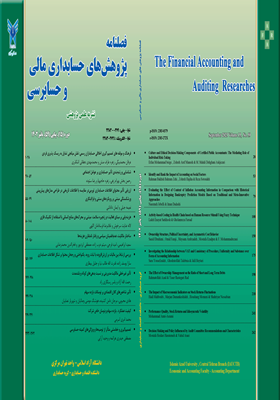Culture and Ethical Decision-Making Components of Certified Public Accountants: The Mediating Role of Individual Risk-Taking
Subject Areas :Erfan Mohammad beigi 1 , Zohreh Aref Manesh 2 , mohammadmahdi Dehghani Ashkezari 3
1 - Graduated from Yazd University with a master's degree in accounting
2 - Assistant Professor of Accounting, Yazd University, Yazd, Iran, (Corresponding Author
3 - assistant professor of Farhangian University
Keywords: Keywords: Culture, Ethical Decision Making, individual risk taking propensity,
Abstract :
Abstract The purpose of this research is to investigate the effect of culture on the ethical decision making of certified accountants with the mediation of individual risk taking propensity. In order to achieve this goal, six hypotheses have been developed. The current research community is certified accountants working in audit institutions registered in Iran, which according to the inquiry made from the certified accountant community of Iran, the size of the community is 472 people. Using Cochran's formula, a sample of 212 people was selected by random sampling. The data was collected using a questionnaire in 1401 and the hypotheses were tested and analyzed using the structural equation modeling method and using Spss and Pls software. The results show a negative and significant relationship between culture and ethical awareness of certified public accountants in Iran, a positive and significant relationship between culture and individual risk taking propensity, a positive and significant relationship between individual risk taking propensity and ethical awareness, the mediating role of individual risk taking propensity positively and significantly On the relationship between culture and moral awareness, a positive and significant relationship between moral awareness and moral judgment, moral judgment and moral intention. According to the research results, culture is effective on ethical decision making. Therefore, the modification of culture indicators will help to improve the ethical decision making of certified public accountants. Due to the fact that few researches have been done in relation to culture, ethical decision-making and individual risk-taking tendency, therefore, conducting this research will help to improve the richness of research and expand theoretical texts in this research field.


